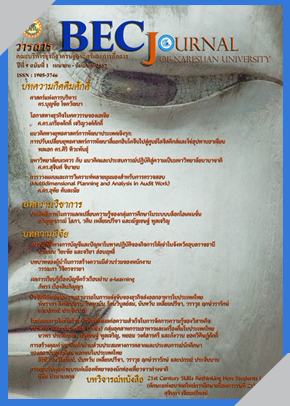ผลการเรียนรู้เรื่องบัญชีครัวเรือนผ่าน e-learning
Main Article Content
บทคัดย่อ
การวิจัยนี้มีวัตถุประสงค์เพื่อ 1) พัฒนาและประเมินประสิทธิภาพของบทเรียนเรื่องบัญชีครัวเรือนผ่าน e-learning และแบบปกติ 2) เปรียบเทียบผลสัมฤทธิ์ทางการเรียนรู้เรื่องบัญชีครัวเรือนของนักศึกษาหลังการทดลอง ระหว่างกลุ่มที่เรียนผ่าน e-learning กับกลุ่มที่เรียนแบบปกติ 3) เปรียบเทียบความพึงพอใจของนักศึกษาต่อบทเรียนเรื่องบัญชีครัวเรือนหลังการทดลอง ระหว่างกลุ่มที่เรียนผ่าน e-learning กับกลุ่มที่เรียนแบบปกติ 4) เปรียบเทียบความคงทนของการเรียนรู้ของนักศึกษาในบทเรียนเรื่องบัญชีครัวเรือนหลังการทดลอง ระหว่างกลุ่มที่เรียนผ่าน e-learning กับกลุ่มที่เรียนแบบปกติ และ 5) เปรียบเทียบผลการเรียนรู้ก่อนกับหลังการอบรม และประเมินความพึงพอใจของชุมชนผู้เข้ารับการอบรมเรื่องบัญชีครัวเรือนผ่าน e-learning ประชากรและกลุ่มตัวอย่าง แบ่งออกเป็น 2 กลุ่ม ได้แก่ 1) กลุ่มที่ 1 ประชากรได้แก่นักศึกษาสาขาการบัญชี ชั้นปีที่ 3 คณะวิทยาการจัดการ มหาวิทยาลัยราชภัฏเพชรบุรี ในภาคเรียนที่ 2 ปีการศึกษา 2555 จำนวน 3 ห้องเรียน รวม 112 คน กลุ่มตัวอย่างได้แก่ นักศึกษาสาขาการบัญชี ชั้นปีที่ 3 คณะวิทยาการจัดการ มหาวิทยาลัยราชภัฏเพชรบุรี ในภาคเรียนที่ 2 ปีการศึกษา 2555 จำนวน 1 ห้องเรียน รวม 44 คน ได้จากการเลือกแบบเจาะจง 2) กลุ่มที่ 2 ประชากรได้แก่ บุคคลในชุมชนตำบลบางขุนไทร อำเภอบ้าน-แหลม จังหวัดเพชรบุรี จำนวน 7,160 คน กลุ่มตัวอย่างได้แก่ผู้เข้ารับการอบรมจากชุมชนตำบลบางขุนไทร อำเภอบ้านแหลม จังหวัดเพชรบุรี จำนวน 33 คน ได้จากการสุ่มตัวอย่างแบบสะดวก ผลการวิจัยพบว่า 1) ประสิทธิภาพของบทเรียนเรื่องบัญชีครัวเรือนผ่าน e-learning และแบบปกติสูงกว่าเกณฑ์ที่กำหนด 2) ผลสัมฤทธิ์ทางการเรียนรู้เรื่องบัญชีครัวเรือนหลังการทดลองของนักศึกษาที่เรียนผ่าน e-learning สูงกว่ากลุ่มที่เรียนแบบปกติอย่างมีนัยสำคัญทางสถิติที่ระดับ .01 3) ความพึงพอใจต่อบทเรียนเรื่องบัญชีครัวเรือนหลังการทดลองของนักศึกษากลุ่มที่เรียนผ่าน e-learning และกลุ่มที่เรียนแบบปกติโดยรวมทุกด้านอยู่ในระดับมากที่สุดทั้งสองกลุ่ม แต่ไม่แตกต่างกันอย่างมีนัยสำคัญทางสถิติ 4) นักศึกษากลุ่มที่เรียนผ่าน e-learning และกลุ่มที่เรียนแบบปกติ มีความคงทนของการเรียนรู้ไม่แตกต่างกันอย่างมีนัยสำคัญทางสถิติ และ 5) ผลสัมฤทธิ์ทางการเรียนเรื่องบัญชีครัวเรือนหลังการฝึกอบรมของชุมชนผู้รับการอบรมจากตำบลบางขุนไทรผ่าน e-learning สูงกว่าก่อนการฝึกอบรมอย่างมีนัยสำคัญทางสถิติที่ .01 และความพึงพอใจของผู้รับการอบรมต่อบทเรียนเรื่องบัญชีครัวเรือนผ่าน e-learning โดยรวมทุกด้านอยู่ในระดับมาก สรุปได้ว่าบทเรียนเรื่องบัญชีครัวเรือนผ่าน e-learning ที่ผู้วิจัยสร้างขึ้นสามารถนำไปใช้ในการเรียนการสอนและการอบรมแก่ชุมชนได้อย่างมีประสิทธิภาพ สถาบันการศึกษาหรือหน่วยงานที่เกี่ยวข้องควรนำไปประยุกต์ใช้เพื่อพัฒนาพฤติกรรมการประหยัดและคุณลักษณะนิสัยการออมของนักศึกษาและประชาชนทั่วไปด้วย
Learning Achievement of Home Accounting Through E-Learning
The purposes of this study were to: 1) develop and evaluate the efficiency of home accounting lessons through e-learning and traditional methods 2) compare the learning achievement of the students after the experiment between e-learning group and traditional group 3) compare the students’ satisfaction after the experiment between e-learning group and traditional group 4) compare students’ learning retention after the experiment between e-learning group and traditional group and 5) evaluate the learning achievement before and after the experiment and the satisfaction of the community trainees after the experiment. The samples were two groups, including 1) 44 third year Accounting major students at the Faculty of Management Science, Phetchaburi Rajabhat University in the second semester of academic year 2012, by purposive sampling, and 2) 33 people at Tambol BangKhunsai, Amphor Banleam, Phetchaburi Province by convenience sampling. The results were as follows: 1) the efficiency of home accounting lessons through e-learning and traditional methods were higher than the determined criterion 2) the learning achievement of the students after the experiment in e-learning group was significantly higher than that in the traditional group at the level of .01 3) The overall satisfaction with home accounting lessons of the students after the experiment in e-learning group and traditional group was at the highest level but not significantly different 4) the home accounting learning retention of the students after the experiment in e-learning group and traditional group was not significantly different 5) the home accounting learning achievement of the community trainees after the experiment was higher than before at the level of 01, and their overall satisfaction was at a high level. In conclusion, home accounting lessons through e-learning constructed by the researcher could be used effectively for teaching and community training. Institutions or related organizations should also applied them for developing economical and saving behaviors of the students and people in general.


